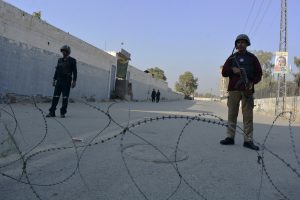On December 20, soldiers from the Special Service Group (SSG), an elite commando unit of the Pakistan Army, killed 25 militants belonging to the banned Tehreek-i-Taliban Pakistan (TTP).
Just days earlier, the TTP had taken several policemen and others hostage at a counterterrorism center at Bannu in Pakistan’s Khyber Pakhtunkhwa province. According to the Inter-Services Public Relations, the military’s media wing, a militant at the center snatched weapons from a guard and was able to free 34 other detained fighters.
The efforts of the Pakistani government and security agencies to persuade the TTP terrorists to agree to an unconditional surrender failed as the latter insisted they be offered free passage to Afghanistan, where the Afghan Taliban are in power. Reportedly, Pakistani security agencies also sought the Afghan Taliban’s help in the matter, but it was of no use.
The Bannu incident provides more evidence that the TTP, an internationally recognized terror group, is not only receiving support from Afghanistan but also has established sanctuaries deep inside that country as well. The TTP’s demand for safe passage for its militants to Afghanistan via a ground route or by air cannot materialize without support from the Kabul regime for such a passageway.
Earlier this month, TTP leader Noor Wali Mehsud attempted to rebuff the impression that his group was getting any support from the Afghan Taliban regime in Kabul. “We are fighting Pakistan’s war from within the territory of Pakistan; using Pakistani soil,” he said in an interview with CNN. But there were no takers for Mehsud’s claims as TTP’s cross-border attacks on Pakistan from Afghanistan continue unabated.
Pakistan’s rejection of the TTP’s demand for safe passage to its militants underscores the country’s resolve to hold the group and its supporters accountable.
Moreover, the elimination of over two dozen militants in the Bannu operation should send a clear message to the TTP’s supporters across the border in Afghanistan that for Islamabad, ties with the Kabul regime should remain independent of the TTP issue.
However, it seems that some factions of the Afghan Taliban are bent on keeping the TTP issue central to their dealings with Pakistan by not addressing Islamabad’s security concerns. A government official from Pakistan’s Interior Ministry told The Diplomat that the Kabul regime has not “given due diligence to Pakistan’s security apprehensions and concerns.” The official added that the recent attack on Pakistan’s top ambassador in Kabul “was a case in point,” wherein the diplomat was “targeted through a deliberate and planned attack inside the Embassy premises.”
The official said that Pakistan has been demanding “at least 40 visas to ensure the security of its diplomatic staff” posted in Kabul and elsewhere in the country. However, “less than 10 visas” have been granted so far, the official lamented.
It is widely perceived that Pakistan goes out of its way to impress the Afghan Taliban, but the current Kabul regime doesn’t respond similarly. To an extent, this puts pressure on Islamabad as many view Pakistan’s policies of tolerantly dealing with the Afghan Taliban as either a sign of weakness or born out of some other compulsions.
While Pakistan has so far patiently engaged with the Afghan Taliban regime, Islamabad’s behavior may change as the international community has renewed efforts to remind the regime in Kabul about counterterrorism-related commitments it made as part of the Doha Accord with the United States in 2020.
The regime in Kabul needs to realize the gravity of the situation. Pakistan is preparing to put pressure on the Afghan Taliban in cooperation with the United States and other international stakeholders, including the United Nations.
“We are concerned by the threats posed by Tehreek-e-Taliban-Pakistan to Pakistani security and stability. During my visit to the GHQ, we discussed opportunities to address this threat,” Commander of the U.S. Central Command (CENTCOM), General Michael E. Kurilla, who visited Pakistan earlier this month said.
Similarly, United Nations Secretary-General Antonio Guterres told the Afghan Taliban that “it is absolutely essential for the Taliban not to allow any form of terrorist activity that might have an impact in relation to Pakistan, as in relation to any other country of the region.”
Earlier this month, five Chinese nationals were injured in a gun attack carried out by the militant Islamic State (IS) group at a hotel in Kabul. Following the attack, China asked its citizens and organizations to leave Afghanistan immediately, indicating its frustration with the Afghan Taliban regime’s failure to ensure security and protect its interests, largely tied with Pakistan, in the region.
Amid these concerning developments, the Afghan Taliban have decided to ban women from universities in Afghanistan, sparking concerns regarding the commitments the group made with the international community in the Doha Accord. Such developments, when seen collectively with the growing presence of other militant groups in Afghanistan, indicate that the Afghan Taliban’s leadership has no interest in transforming their group into a political organization that the world may accept some day.
But that doesn’t mean that Afghanistan’s neighboring countries and the world at large will not change their attitude toward the Afghan Taliban if the group refused to adapt or address the international community’s concerns.
Going forward, the Afghan Taliban leadership has to demonstrate that they are willing and can take on not only the TTP but other militant groups operating from Afghanistan.
The issue of the TTP is not Pakistan’s issue anymore, as the group has been labeled an internationally designated terrorist organization that poses threats beyond Pakistan.
The Afghan Taliban should not expect the world to offer them legitimacy or help them govern when they are bent on nurturing militants in their backyard.

































